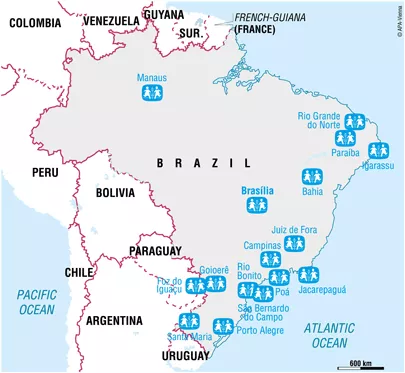
SOS relies on the kindness and generosity of Canadians to be able to provide a home for the most vulnerable children around the world.
By becoming a child sponsor you are helping an individual child in need.
(You will receive a Canadian charitable tax receipt)
Please help us ensure a loving home for every child. Sponsor a child in South America now.
SOS Children's Villages in Paraíba
SOS Children’s Village Paraíba began its work in João Pessoa in 1987. Today, our social centre here provides a family strengthening programme, which aims to alleviate hardship in the community in a holistic and sustainable manner. Its services include a day-care centre and childminding programme where over 1,100 children can be cared for. This allows working parents and single mothers to leave their children in safe hands while they are out making a living. Our efforts also address the needs of parents, providing support and training to over 450 adults.
For children from the area who are no longer able to live with their parents, five SOS families can provide a loving home. In each family, the children live with their brothers and sisters and are affectionately cared for by their SOS mother.

Both children from the village and from the local community can attend the SOS Children's Villages primary school in João Pessoa, which is now run by the municipality. This ensures that children from the SOS Children’s Village are integrated into the community from a young age.
When young people from the village feel ready to move out of the family home in order to pursue further education or vocational training, the SOS Youth Programme makes shared accommodation available to them. With the support of qualified counsellors, the young people live together and learn to take responsibility, plan their future and prepare for independent adult life.
A large informal sector means a precarious life for thousands of families
The SOS Children’s Village Paraíba is located in João Pessoa, the capital of the Paraíba state on the easternmost point on the coast of Brazil. The town has a population of roughly 733,000 inhabitants. Its economy is based mainly on the service industry.
Much of the work to be had in this sector is informal, however, and therefore lacks security. Low or unpredictable incomes exclude people from owning their own home or land forcing them to live in the neighbourhoods of the “landless”, where most of the housing is of low standard and infrastructure is severely lacking.
High rates of poverty and illiteracy exacerbate the dire situation of Paraíbas young people
Paraíba has historically been one of the poorest states in the country and in the 1990s, almost 70 per cent of its population lived in conditions of poverty. While living conditions have improved for many, about half of the population of Paraíba state still live on less than half of one minimum income.
In recent years, illiteracy has been greatly reduced in Brazil overall, however in Paraíba it remains high at 21.6 per cent (2009) in people aged 15 and over. In João Pessoa, there are 2,700 young people who are illiterate. The figures are even higher when it comes to functional illiteracy, which reaches 33.4 per cent in Paraíba. This means that a third of the population in the state are unable to read or write beyond the most basic level. Illiteracy rates for Afro-Brazilians are about twice as high as for those of European descent, which is an indication of the deep-seated racial divides that continue to exist in Brazilian society.
Education is one way to give children from poorer families the chance to do well for themselves as they become adults and break the cycle of poverty.
Our Impact
Image

SOS Social Centres in Brazil aim is to help families, in particular women and children, living in communities neighbouring the SOS Children's Villages to gradually escape from poverty, and to help young people become self-reliant. |
2 SOCIAL CENTRES | 802 Beneficiaries |
Image
The SOS Children's Village in Brazil provides loving homes to orphaned and abandoned children |
1 VILLAGES | 29 Orphaned and Abandoned Children |
Our Impact

